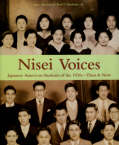|
The AACP Newsletter |
||
| Since 1970 | Asian American Curriculum Project, Inc. - Books for All Ages | March 2004 |
| Newsletter Home Page | Event Schedule | AsianAmericanBooks.com | Editor's Notes | Featured Books |
At a GlanceAnother look at an 1877 murder of four Chinese American workers.
Historical Retelling of the Lemm Ranch Murders
A Simple Child Custody Case?
He vs. Baker |
|
||||||||
Up Coming EventsHere are some events that AACP will soon be attending. Invite us to your events.
Give Us Your FeedbackPlease feel free to send us your reviews, comments, and book suggestions. You can contact us at -aacpinc@asianamericanbooks.com |
Editor's MessageHello everyone. I'm writing this from the University of San Francisco where the Reading the World Conference is being held. There are a bunch of authors floating around the area. I met Eric Chock (editor and writer with the publisher Bamboo Ridge Press), Anthony Robles (writer of Lakas and the Manilatown Fish), Debbie Yamada (writer of Striking It Rich: Treasures from Gold Mountain), Milly Lee (writer of Earthquake and Nim and the War Effort), Stanley Terasaki (writer of Ghosts for Breakfast), and Philip Lee (founder and editor of the publisher Lee and Low Books). If you are an educator or librarian with interests in multi-cultural education, this is probably one of the best events of its kind in Northern California. Take note and make your plans to go next year.
On to My Usual Business A cautionary note to everyone - there are lots of computer viruses being passed around right now. If you get a suspicious email supposedly from me that has an attachment and you are not expecting an email with attachment from me, please do not open it. This is probably good advice for all email that you receive. Also, if you at some point stop receiving our newsletter for multiple months in a row, you may have filtering software that screens out our emails being sent to you. You can check to see if you received the latest newsletter by going to our website archive newslet.htm. If there is a newsletter that you did not receive that is posted on this page, then you may have this filtering problem. Please inform me to the problem and we will try to work something out.
Leonard Chan |
||||||||||||||||||||||||||||||||||||
The following books are discounted for subscribers to our newsletter. The discounts on these books end April 12, 2004 | |

|
Nisei Voices
Edited by Joyce Hirohata and Paul T. Hirohata |

|
Cooper's LessonBy Sun Yung ShinIllustrated by Kim Cogan 2004, 31 pages, hardback, written in English ahd Korean. Cooper's Lesson is an engaging story of how a young biracial Korean American boy learns from the local grocer to like his Korean cultural roots. This is another marvelous book from Children's Book Press.
View Additional Information
|

|
The Tao of Yao
By Oliver Chin |

|
Sumi's First Day of School EverBy Soyung PakIllustrated by Joung Un Kim 2003, 32 pages, hardback. Sumi's First Day of School Ever is a charming book about a Korean American girl named Sumi and her first day of school. Learn how she overcomes her initial issues of not knowing how to speak English, looking different, and just being the new kid in class.
View Additional Information
|

|
Dream JungleBy Jessica Hagedorn2003, 325 pages, hardback. Dream Jungle is a story of a tumultuous country in crisis that evokes the desperate beauty and the rank corruption of the Philippines from the height of the Marcos era in the mid-1970s to the end of the twentieth century. Like the works of Gabriel Garcia Marquez, it explores the many sides of culture, identity, and class through the eyes of larger-than-life characters with diverse yet equally compelling voices.
View Additional Information
|
Copyright © 2004 by Asian American Curriculum Project, Inc. (a non-profit organization since 1970)
Visit our website at AsianAmericanBooks.com
To unsubscribe simply reply to this email and type "REMOVE" in the subject line.